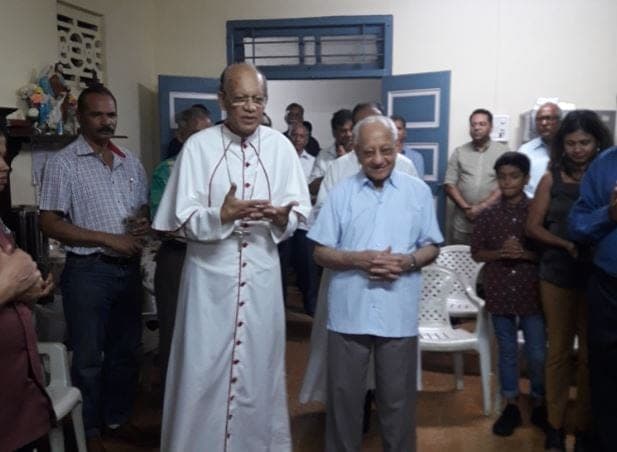MUMBAI, India — Cardinal Oswald Gracias, the Archbishop of Bombay, has instituted the “Msgr. Nereus Rodrigues Educator Award” to honor a longtime advocate for education in the archdiocese.
The announcement was made as the cardinal announced he was giving Rodrigues a lifetime achievement award to honor him as he marked his 95th birthday.
The new award named for him will go to the “best educator” in the Archdiocese of Bombay.
Rodrigues also celebrated 60 years in the archdiocese’s education apostolate; the priest still serves as a trustee to St. Andrew’s College in the archdiocese.
He was the college’s founding trustee and first principal and continued as rector until 2011.
“I ‘learnt’ education, under Msgr. Nereus, when I was a headmaster of a middle school and Msgr. Nereus was principal. That was my only experience in Education and I learnt from the best,” Gracias said.
During his time in education ministry, Rodrigues served as the inspector of Catholic Schools. He also headed the Headmasters’ Association, which represented all schools – religious and secular, and was once awarded the State’s Best Teacher Award. Later, he was elected the president of the All-India National Association of Catholic Schools.
The honors have not stopped coming: In 2018, St. Andrew’s College received the Best College Award, handed out by the University of Bombay.
One of Rodrigues’s proudest achievements was the establishment of the Cardinal Poupard Foundation – which established a chair for interreligious and intercultural dialogue at the college.
Poupard is a French cardinal that served as president of the Vatican’s Council for Culture from 1988-2007; the last 18 months of his term, he also headed the Vatican’s Council for Interreligious Dialogue.
Reflection on his time as the inspector of Catholic schools, Rodrigues said it was important work.
“Inspection was a means to evaluate the academic teaching, administration, curriculum, time tables as well as fidelity to the teaching of religion and morals. The inspection report became a very useful document in the hand of the schools inspected, the Inspector, as well as the archbishop,” the priest said.
“There came about a growing sense of accountability in the implementation of the recommendations following the inspection. Regulations were strictly enforced, and the schools functioned at optimum levels,” he continued.
With his knowledge of rules and uncompromising insistence on quality, he helped many an institution to raise their benchmark and go beyond what was expected.
“In Bombay, as it was known in those days, there were many neighborhoods where poorer sections of Catholics lived, and we welcomed their children, who were first-generation learners, into the schools,” Rodrigues said. “They were treated on par with the students from ‘well-to-do’ families – there was no distinction, and all our students were given the same opportunities.”
The priest said the children flourished with both intellectual and religious knowledge, and later could take up jobs and become self-sufficient and empowered.
There are now around 150 institutions of learning at all levels in the archdiocese. Although Catholics make up less than 3 percent of the population, the schools have an important role to play for all the citizens. Over half of those educated in these institutions are non-Catholic.
“Education, we need to realize, makes a great contribution in sowing hope to lead a new life characterized by all that is beautiful, good, and true,” Rodrigues said. “Through our schools and colleges, Catholic education is responsible for positively changing and transforming the face of society.”
When asked about his life, however, the 95-year-old merely offers a shy smile.
“We are unworthy servants; we have only done our duty,” he said.

















